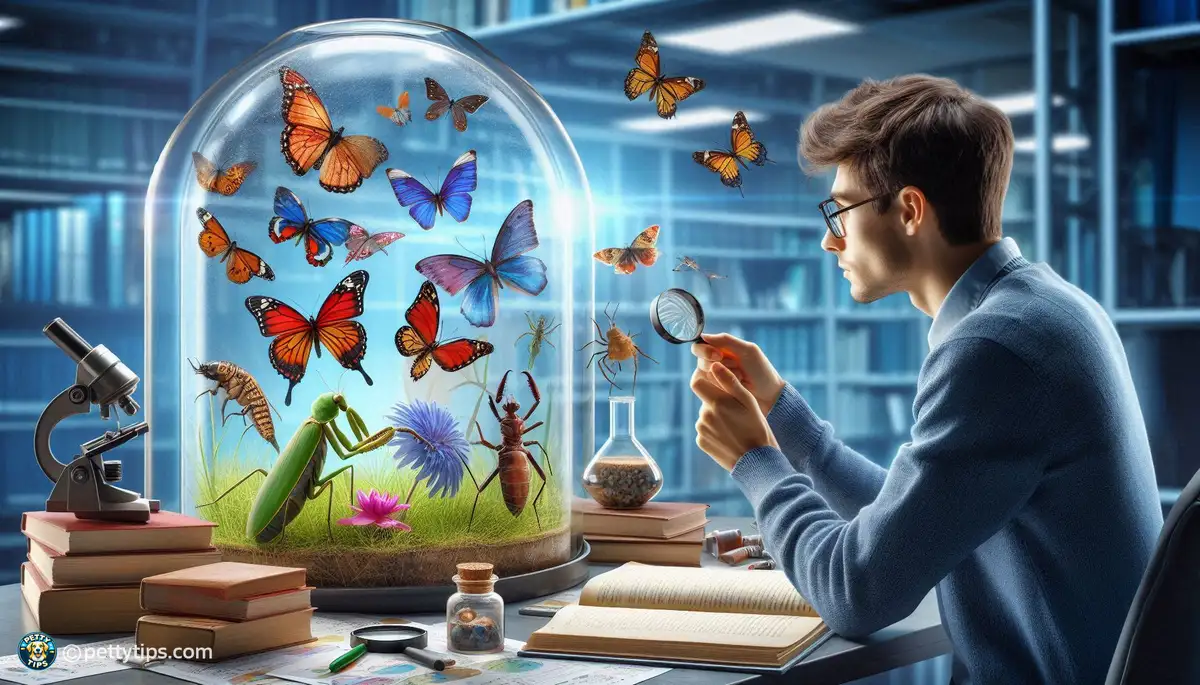- Home
- Exotic Pets
- Exploring the Growing Trend: Keeping Insects as Pets
Exploring the Growing Trend: Keeping Insects as Pets

- 1. The Fascination with Tiny Companions
- 2. The Rise of Entomophiles: Embracing Insect Diversity
- 3. Eco-Friendly Companions: Insects as Sustainable Pets
- 4. Educational Opportunities: Learning from Tiny Teachers
- 5. Therapeutic Benefits: The Calming Presence of Tiny Creatures
- 6. Accessibility and Affordability: Insects for All Budgets
- 7. Overcoming Misconceptions: Dispelling Myths About Insect-Keeping
- 8. Ethical Considerations: Responsible Insect Ownership
- 9. Conclusion: Embracing the Beauty of Tiny Wonders
The Fascination with Tiny Companions
A Closer Look at Insect-Keeping
In recent years, there has been a notable surge in the trend of keeping insects as pets. From colorful beetles to elegant stick insects, these tiny creatures are captivating the hearts of pet enthusiasts worldwide. But what exactly is driving this newfound fascination with insect-keeping?
Understanding the Appeal
The appeal of keeping insects as pets lies in their unique characteristics and low maintenance requirements. Unlike traditional pets such as dogs or cats, insects typically require minimal space, making them suitable for individuals living in apartments or small homes. Additionally, many insect species have fascinating behaviors and intricate physical features, providing endless opportunities for observation and study.
The Rise of Entomophiles: Embracing Insect Diversity
Diverse Selection of Species
One of the key factors contributing to the popularity of insect-keeping is the wide variety of species available to enthusiasts. From the vibrant hues of dart frogs to the delicate beauty of praying mantises, there is an insect species to suit every taste and preference.
The Appeal of Exoticism
For many entomophiles, the allure of keeping insects as pets lies in their exoticism. Unlike more traditional pets, such as dogs or cats, insects offer a unique glimpse into the natural world, allowing enthusiasts to experience the wonders of biodiversity up close.
Eco-Friendly Companions: Insects as Sustainable Pets
Minimal Environmental Impact
In an era where sustainability is a growing concern, insects offer a compelling alternative to conventional pets. Unlike larger animals, insects require minimal resources to thrive, making them a more eco-friendly choice for environmentally-conscious individuals.
Role in Conservation Efforts
Furthermore, keeping insects as pets can play a role in conservation efforts by promoting awareness and appreciation for lesser-known species. By showcasing the beauty and diversity of insects, enthusiasts can help raise funds and support for habitat preservation and species conservation initiatives.
Educational Opportunities: Learning from Tiny Teachers
Hands-On Learning Experience
In addition to their entertainment value, insects also offer valuable educational opportunities for individuals of all ages. From children learning about life cycles to adults studying complex behaviors, keeping insects as pets provides a hands-on learning experience that cannot be replicated in a classroom setting.
Encouraging Curiosity and Inquiry
By observing and interacting with insects in a home environment, enthusiasts can foster a sense of curiosity and inquiry about the natural world. This curiosity can lead to a deeper appreciation for the interconnectedness of all living organisms and inspire individuals to become advocates for environmental conservation.
Therapeutic Benefits: The Calming Presence of Tiny Creatures
Stress Reduction
In today's fast-paced world, many people are turning to pets for emotional support and stress relief. Insects, with their gentle movements and soothing presence, can provide a calming influence in times of anxiety or distress.
Mindfulness and Meditation
Moreover, caring for insects can promote mindfulness and meditation by encouraging individuals to focus on the present moment and engage with the natural world. The simple act of observing a beetle exploring its enclosure or a caterpillar munching on a leaf can bring a sense of peace and tranquility to the mind.
Accessibility and Affordability: Insects for All Budgets
Cost-Effective Pet Care
Compared to traditional pets, such as dogs or cats, keeping insects as pets is often more affordable. Initial setup costs are minimal, and ongoing expenses, such as food and substrate, are typically inexpensive, making insects accessible to individuals of all budgets.
Space-Saving Solutions
Additionally, insects require minimal space, making them ideal pets for individuals living in small apartments or homes with limited outdoor space. Even those with busy lifestyles can easily accommodate the needs of a pet insect without the space constraints associated with larger animals.
Overcoming Misconceptions: Dispelling Myths About Insect-Keeping
Cultural Stigma
Despite their growing popularity, insects as pets still face cultural stigma in some societies. Many people view insects as dirty or undesirable creatures, associating them with pests rather than pets.
Educating the Public
To overcome these misconceptions, it is essential to educate the public about the benefits of insect-keeping and the proper care requirements for pet insects. By dispelling myths and highlighting the joys of insect companionship, enthusiasts can help change societal attitudes towards these fascinating creatures.
Ethical Considerations: Responsible Insect Ownership
Ethical Sourcing
Responsible insect ownership involves ethical sourcing practices to ensure that pets are obtained through legal and sustainable means. Enthusiasts should avoid purchasing insects collected from the wild and instead support reputable breeders and suppliers who prioritize animal welfare and conservation.
Proper Husbandry
Furthermore, proper husbandry is essential for the well-being of pet insects. This includes providing suitable enclosures, a balanced diet, and appropriate environmental conditions to mimic their natural habitat as closely as possible.
Conclusion: Embracing the Beauty of Tiny Wonders
In summary, the growing popularity of keeping insects as pets can be attributed to various factors, including their unique characteristics, eco-friendliness, educational value, and therapeutic benefits. By embracing these tiny wonders, enthusiasts not only enrich their own lives but also contribute to the conservation and appreciation of the natural world. Whether you're a seasoned entomophile or a curious newcomer, there's never been a better time to explore the fascinating world of insect companionship.
